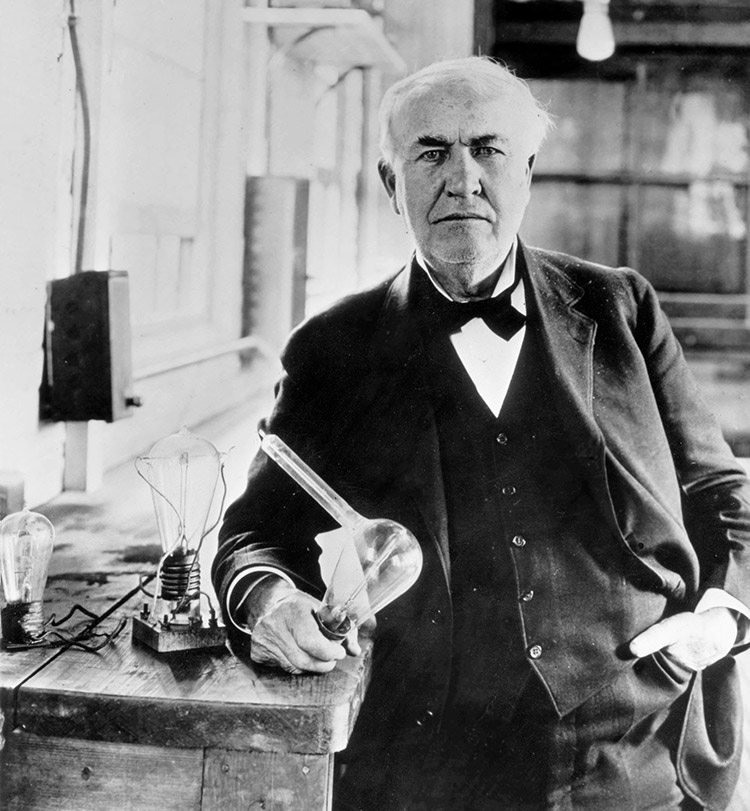Did Edison Steal the Invention of Electricity?
"Unraveling the Mystery Behind Edison's Invention of Electricity"

Source www.historyhit.com
Who Really Invented Electricity
The Early Concepts of Electricity
Electricity has been known since ancient times, with the ancient Greeks and Romans having an understanding of static electricity produced by rubbing certain materials together. This early concept of electricity was limited and did not reach its full potential until later in history.
The Race to Harness Electrical Power
The race to harness electrical power began in the 17th century when scientists started experimenting with static electricity. During this time, Pieter van Musschenbroek, a Dutch scientist, invented the Leyden Jar, a device that could store and release electrical charge. Leyden Jar was the first capacitor, which revolutionized the field of electricity by storing and releasing electrical energy.
The Father of Electricity
Benjamin Franklin, a renowned American polymath, is widely considered as the father of electricity. Through his famous kite experiment, he demonstrated that lightning was a form of electrical energy. He also coined some of the fundamental terms used in electricity such as "positive" and "negative". Franklin was one of the first scientists to investigate the principles of electrical grounding, which later became an essential concept for electrical safety.
While Franklin is often credited as the father of electricity, the truth is that the development of this field involved the collective work of many scientists over centuries. It is believed that the discovery of electricity can be traced back to ancient Egypt and Mesopotamia, where electric fish was used for medical purposes.
The discovery of electricity has been one of the most significant technological advancements in human history. It has been harnessed for various applications, from powering our homes to revolutionizing the way we communicate. Over the years, the field of electricity has continued to evolve, with new technologies being developed every day.
When it comes to the history of technology, the question of who invented what first can be a bit difficult to answer.
Alternatives to Franklin's Discovery
The Contested Claim of Luigi Galvani
Luigi Galvani, a physician and physicist from Italy, claimed to have discovered bioelectricity by conducting experiments on the muscles of frogs. He believed that the twitching movements of the frogs' legs were due to a new type of electricity that had not been seen before. However, his claim was challenged by his contemporary, Alessandro Volta, who argued that the effects Galvani observed were due to the chemical reactions between the frog's tissues and the metals used in the experiments.
This ongoing dispute between Galvani and Volta, known as the Galvani-Volta controversy, lasted for many years and had significant implications for the development of electrical technology. Volta's work eventually led to the invention of the battery, which was a crucial step in the practical application of electricity.
The Ongoing Debate of Nikola Tesla
Nikola Tesla was a Serbian-American inventor who made numerous contributions to the field of electrical technology. He developed the alternating current (AC) electrical system and was a pioneer in the design of motors and generators. Despite his impressive achievements, Tesla's claims to be the inventor of electricity have been contested by some historians and scientists.
Many of Tesla's inventions and discoveries were overshadowed by his more famous contemporary, Thomas Edison. Edison hired Tesla to work at his lab in New Jersey, but the two inventors had different approaches to the field of electrical technology. Edison favored direct current (DC) systems, while Tesla championed the more efficient AC system. Their rivalry and differing opinions have often been cited as a reason why Tesla's contributions to the field of electrical technology have been overlooked.
The Modern View of Electricity
Today, the prevailing view among scientists is that electricity was not "invented" by any single individual, but is a natural force that has always existed. The development of our understanding of electricity and its practical applications has been a gradual process that has spanned centuries.
Early experiments with static electricity by ancient Greeks such as Thales of Miletus and William Gilbert of England laid the foundations for modern understandings of electrical phenomena. This was followed by the invention of the battery by Alessandro Volta in the 18th century and the subsequent development of electric motors and generators by Michael Faraday and others in the 19th century.
During the 20th century, electricity became an increasingly important part of daily life and technology continued to evolve, with the development of telecommunications, electronics, and computers. Today, electricity is an integral part of modern society, facilitating everything from transportation and communication to healthcare and entertainment.
In conclusion, while there have been many individuals who have contributed to our understanding and application of electricity, the modern view is that this natural force has always existed and our knowledge of it has evolved gradually over time.
Many people associate tractor with farming and agricultural equipment, but these machines have come a long way over the years.




Post a Comment for "Did Edison Steal the Invention of Electricity?"